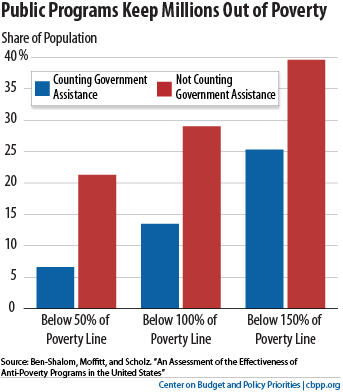off the charts
POLICY INSIGHT
BEYOND THE NUMBERS
BEYOND THE NUMBERS
Public Programs Keep Millions Out of Poverty, New Study Shows
Receive the latest news and reports from the Center
With anti-poverty programs under serious attack in Washington, here’s something to keep in mind: a major new study from the National Bureau of Economic Research (NBER) finds that public programs keep one in six Americans out of poverty — primarily the elderly, disabled, and working poor — and that the poverty rate would double without these programs.
Without the cash and non-cash income provided by programs such as Social Security, SNAP (formerly food stamps), and the Earned Income Tax Credit:

The House-passed budget would impose draconian cuts on programs for low- and moderate-income families, ranging from SNAP and Medicaid to rental assistance, Pell Grants, and Head Start. Current proposals to impose annual limits on federal spending or insert a balanced budget requirement into the U.S. Constitution would force the same kinds of cuts. Proponents of slashing these programs claim the safety net actually creates more poverty by reducing recipients’ incentives to work. But, here’s the reality: scaling back these programs would have “almost no” effect on people’s chances of avoiding poverty through greater employment, according to the NBER study. That means that, on balance, the cuts in the House-passed budget would greatly increase the amount and severity of poverty.
The NBER study also finds that while government help rose for certain low-income groups over the past two decades, it shrank for others — and these cuts triggered a worrisome rise in deep poverty among those who received less assistance. I’ll write more about that in the coming days.